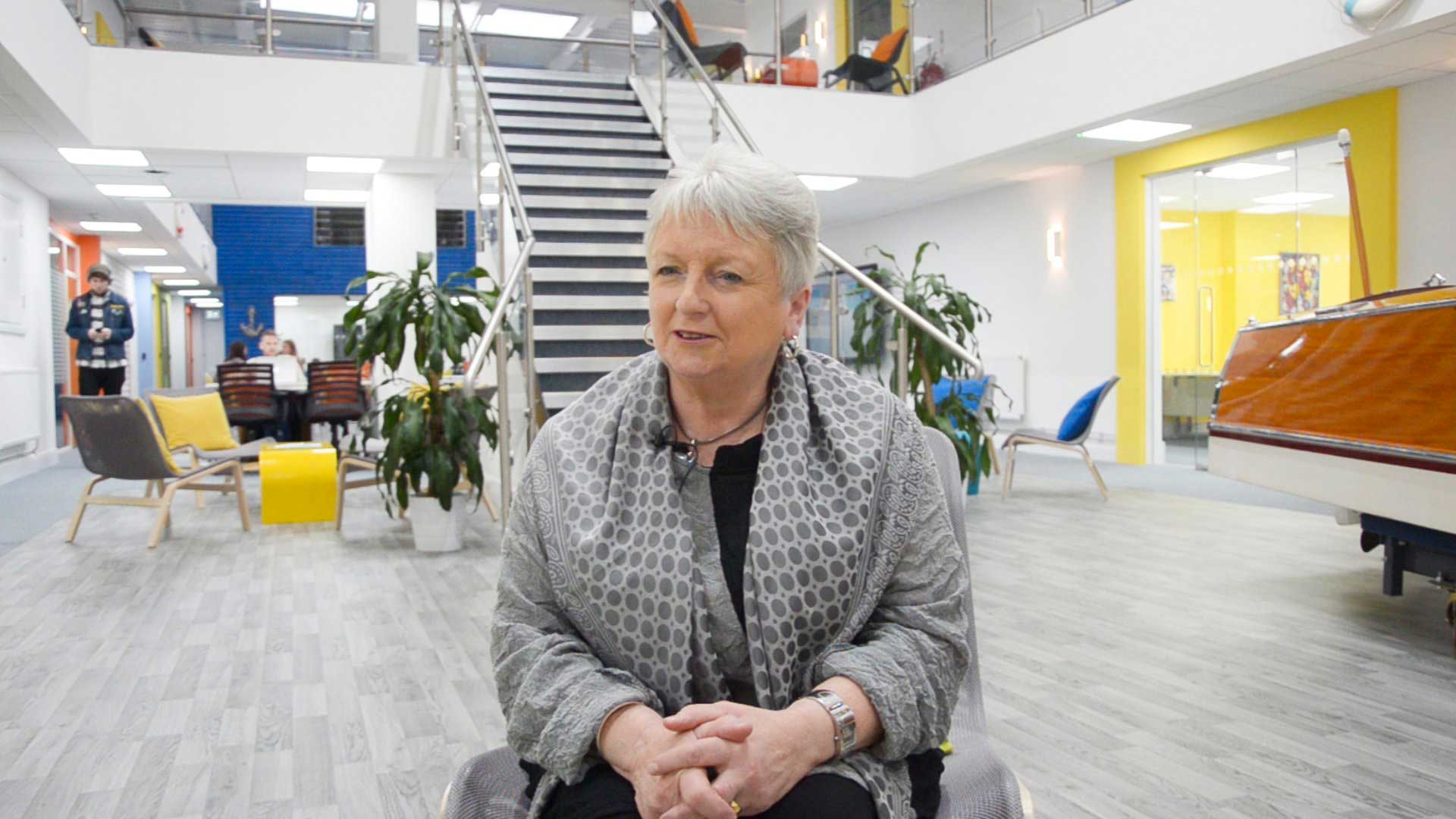Cymraeg
Hanfod Cymru yn cyhoeddi ddod i ben

MAE BWRDD Hanfod Cymru, yr elusen ddyrannu grantiau, wedi cyhoeddi ei fod am ddod i ben yn ystod haf 2019 – er gwaetha ei lwyddiant ysgubol yn dyrannu grantiau gwerth £120,000 i 52 o elusennau yn y cyfnod ers ei lansio ym mis Ebrill 2017. Mae’r penderfyniad hwn yn uniongyrchol gysylltiedig â phenderfyniad Bwrdd Loteri Cymru i roi’r cwmni hwnnw yn nwylo’r gweinyddwyr ar 27ain Mawrth ar ôl 11 mis o fasnachu.
Er bod Hanfod Cymru yn elusen ac yn gwmni cwbl annibynnol, Loteri Cymru oedd unig ffynhonnell ariannol Hanfod Cymru i’w alluogi i ddosbarthu grantiau. Mae Bwrdd Hanfod Cymru wedi bod yn rhan o’r trafodaethau i geisio dod o hyd i brynwr newydd ar gyfer Loteri Cymru ond daeth y Bwrdd i’r farn wythnos diwethaf, gyda Loteri Cymru yn nwylo gweithredwr newydd, na fuasai Hanfod Cymru yn medru dosbarthu grantiau ar lefel ddigonol i fedru bodloni amcanion canolog yr elusen, sef gwneud gwahaniaeth gwirioneddol i elusennau ar lawr gwlad cymunedau Cymru.
Dywedodd Deris Williams, Cadeirydd Hanfod Cymru: “Mae’r flwyddyn ddiwethaf ers lansio Hanfod Cymru, wedi bod yn un lwyddiannus tu hwnt. Rydym wedi gwneud gwahaniaeth gwirioneddol i elusennau ar lawr gwlad ar draws Cymru. Rydym wedi bod yn ffodus tu hwnt hefyd o fod wedi cael aelodau nodedig o staff i yrru’r elusen ymlaen ac mae’n fater o dor-calon i fwrdd Hanfod Cymru ein bod yn awr angen gwneud y staff yn ddi-waith. Bydd Siôn Brynach, y Prif Weithredwr ac Angharad Gaylard, y Swyddog Gweinyddu Grantiau, yn gadael eu swyddi ar ddiwedd Mai eleni.
“Bwriad Bwrdd Hanfod Cymru bellach yw bodloni’r gofynion statudol sydd arnom, a chymryd y camau sydd eu hangen i ddod â’r elusen i ben. Disgwyliwn fedru gwneud hynny erbyn haf 2019.”
Aeth Deris yn ei blaen gan ddweud: “Mae Hanfod Cymru wedi gwneud gwahaniaeth gwirioneddol i’r tirwedd ariannu yng Nghymru dros y flwyddyn ddiwethaf. Yn ogystal mae’r staff wedi arloesi ym maes cyhoeddusrwydd gan gyhoeddi fideo ar wefan Hanfod Cymru a thrwy’r cyfryngau cymdeithasol yn wythnosol er mwyn tynnu sylw nid yn unig at Hanfod ei hun, ond hefyd at yr elusennau sydd wedi derbyn grantiau gennym.
“Mae’n fater o falchder i’r Bwrdd ac i’r Staff ein bod wedi llwyddo i godi proffil yr elusen mor effeithiol mewn amser mor fyr, ac yn siomedig tu hwnt bod angen yn awr i ni ddod â’r gweithgarwch nodedig hwn i ben.
“Er na fyddwn yn medru dosbarthu unrhyw grantiau pellach, byddwn yn dod â’r elusen i ben gyda record gwirioneddol drawiadol o fod wedi cynorthwyo 52 o elusennau led-led Cymru trwy ddosbarthu grantiau gwerth £120,000 i wneud gwahaniaeth go iawn i bobl ar lawr gwlad.”
Cymraeg
Last ditch plea to HSBC to reverse decision to axe Welsh language phone line

AN MS has issued a last ditch plea to HSBC to reverse its “unacceptable” decision to axe its Welsh language phone service.
Llŷr Gruffydd, who represents North Wales in the Senedd, has spoken out as January 15, the date when the phone line is due to come to an end fast approaches.
The Plaid Cymru politician said executives at the baking giant still have an “opportunity to do the right thing”.
HSBC came under fire after politicians were informed of the bank’s decision to axe its Welsh language service by letter on Wednesday, November 8.
The Senedd’s Culture Committee wrote to the corporation accusing it of “contempt” towards Welsh speakers.
It added that its “failure to maintain an approach consistent with its values is considered disingenuous and disturbing”.
The committee also questioned statements made by José Carvalho, HSBC’s head of wealth and personal banking, who spoke in front of it on November 29.
The banker said that the Welsh-language helpline receives around 22 calls a day, and that the bank had ended up “with only 6% of the calls that are coming in being answered in Welsh” by them.
However, the committee hit back saying this indicates a fundamental failure of service by the bank because it means 94% of calls to the service are not being answered in Welsh,.
The Committee said that the “low number of calls” to the line “reflects” the bank’s “inability to provide a functioning and coherent service that meets the needs of its Welsh speaking customers.”
Llŷr Gruffydd said: “HSBC still has an opportunity to do the right thing by reversing its unacceptable and wrongheaded decision to bring its Welsh language phone service to an end.
“Executives at HSBC should remember that many customers use their banking services because of its Welsh language phone service.
“The bank argues that there isn’t sufficient demand for the helpline because it receives 22 calls a day on average.
“But it’s abundantly clear from the data that with only 6% of those calls being answered in Welsh, they’ve not been coming anywhere near to providing an adequate service.
“Phone calls that are made to the helpline in Welsh should be answered in Welsh. It’s no wonder that a lot of Welsh speakers have given up on phoning it.
“Instead of scrapping the service HSBC’s should invest in it properly for at least 12 months, and that includes ensuring that it is well-advertised. Then at the end of that period it could make a much better assessment of demand.
“The bank’s pledge to ‘arrange a call back in Welsh, within 3 working days is astonishingly disrespectful to Welsh speakers, as well as utterly insensitive to the financial pressures some people will face.
“For a significant number of people, accessing their bank through Welsh is not a ‘choice’ as HSBC claimed.
“HSBC say they ‘have confirmed that all customers can bank in English’, which is frankly an attitude that belongs to the last century. It is also untrue, especially for many elderly and vulnerable people.
“There is understandably a huge amount of anger and frustration right across Wales with HSBC’s general attitude towards the Welsh language.
“Recently I was contacted by a constituent who was quite rightly angry because she had been asked by a member of HSBC’s customer care team to resend a Welsh language query in English.
“That is one of many examples of HSBC’s complete and utter disregard for Welsh speakers.
“As a Welsh speaker myself and as a member of the Senedd’s Culture Committee, I share the real sense of frustration that’s out there.
“Many of their customers in Wales have also seen their local branches close over the last decade.
“The impact of this on their older customers is particularly acute, as well as those who don’t have access to digital technology.
“Though HSBC likes to describe itself as the world’s local bank, it is abundantly clear that this is not the case in Wales as it abandons Welsh speakers and abandons our high streets by shutting down local branches.”
Cymraeg
Ffermwr yn dysgu popeth y mae angen iddo wybod am ffermio modern drwy Cyswllt Ffermio

CYFLWYNODD ei rieni ef i ochr ymarferol ‘tir a da byw’ ffermio yn ifanc iawn, ond i Dylan Morgan, a aned yn Sir Gaerfyrddin, Cyswllt Ffermio sy’n rhoi’r wybodaeth ddiweddaraf i’r unigolyn yma a raddiodd mewn rheoli adeiladu. Dywedodd Dylan fod Cyswllt Ffermio wedi rhoi’r sgiliau a’r wybodaeth sydd eu hangen arno i fod y ffermwr ifanc blaengar a hyderus ydyw heddiw.
“A’r peth sy’n wych amdano yw, nad oedd rhaid i mi eistedd trwy oriau o ddarlithoedd theori amaeth am dair blynedd!”
Dywedodd Dylan mai agwedd Cyswllt Ffermio at ei holl wasanaethau hyfforddi a throsglwyddo gwybodaeth yw cyflwyno popeth ar y lefel gywir ar gyfer ffermwyr prysur ond profiadol sy’n gweithio.
“Mae’n ddull o ddysgu ar sail ‘angen gwybod’ sy’n apelio’n fawr ataf gan fy mod yn gallu gwneud lle iddo o amgylch fy nyletswyddau fferm ac ymrwymiadau eraill,” meddai Dylan.
Nid oedd gan Dylan unrhyw fwriad i ddod yn ffermwr pan adawodd Brifysgol Abertawe yn 2011, ond ar ôl ychydig fisoedd yn unig o ffermio’n llawn amser ar fferm bîff a defaid 360 erw ei deulu ger Llanymddyfri, newidiodd ei feddwl yn llwyr.
Roedd yn amlwg yn benderfyniad cywir i’r teulu cyfan ac mae Dylan (32) bellach wedi bod yn ffermio gartref ers bron i un mlynedd ar ddeg.
“Roeddwn i wastad wedi mwynhau helpu gartref pryd bynnag roedd gen i amser rhydd, felly roeddwn i wedi hen arfer ag ochr ymarferol ffermio, ond gan na astudiais i amaethyddiaeth yn y brifysgol, roeddwn i’n teimlo bod yna lawer nad oeddwn i’n ei wybod am iechyd anifeiliaid, pridd a rheoli glaswelltir a’r holl elfennau eraill o ffermio sy’n hanfodol i wella effeithlonrwydd ar y fferm.
“Mae’n hanfodol, fel ffermwyr, fod gan bob un ohonom y wybodaeth sydd ei hangen arnom a systemau yn eu lle i chwarae ein rhan i gadw at y safonau uchaf o les anifeiliaid, cynhyrchu da byw o’r ansawdd uchaf, gan hefyd warchod ein hamgylchedd naturiol a lleihau ein hôl troed carbon.”
Yn gefnogwyr hirdymor gwasanaeth Cynghori Cyswllt Ffermio, a welodd Dylan, ei dad a ffermwyr lleol eraill yn cael cyngor ar faterion yn cynnwys cynllunio rheoli maetholion, archwiliadau carbon a rheoli glaswelltir, mae Dylan yn rhoi llawer o’i amser hamdden i’w ddatblygiad personol.
Gan ddibynnu’n drwm ar ei swyddog datblygu lleol, Alun Bowen, i roi’r wybodaeth ddiweddaraf iddo am yr hyn sydd ar gael, mae Alun wedi cyfeirio Dylan – yn aml yng nghwmni ei dad – at nifer o weithdai iechyd a lles anifeiliaid ar bynciau’n amrywio o ffrwythlondeb y ddiadell a cholledion wyna i wneud y mwyaf o gynhyrchiant buchod sugno, cloffni a rheoli tir. Mae Dylan hefyd wedi dilyn cyrsiau hyfforddi byr â chymhorthdal ac mae’n defnyddio ystod gynhwysfawr y rhaglen o fodiwlau e-ddysgu a ariennir yn llawn yn rheolaidd.
“Mae dysgu ar-lein, mewn cyfnodau byr o 20 munud, gyda chwis ar ddiwedd pob modiwl i sicrhau eich bod wedi cymryd yr holl wybodaeth allweddol i mewn, yn ffordd wych o gynyddu eich gwybodaeth.”
Mae Dylan wedi canolbwyntio’n bennaf ar bynciau iechyd anifeiliaid yn ogystal â rheoli pridd a glaswelltir oherwydd ei fod yn credu’n gryf mewn mabwysiadu agwedd gyfannol at y fferm, gydag ‘arfer gorau ym mhopeth a wnawn’ yn rhan o’u hagenda cynaliadwyedd.
“Diolch i fy ngwybodaeth a sgiliau newydd a thrwy weithredu rhai o’r systemau newydd rydym wedi dysgu amdanynt trwy Cyswllt Ffermio, rydym bellach yn bwydo’r stoc yn llawer mwy effeithlon.
“Mae hyn wedi lleihau ein mewnbynnau’n sylweddol wrth wella perfformiad stoc a chynhyrchiant ac rydym hefyd wedi lleihau lefelau cloffni.”
Mae’r teulu’n sgorio cyflwr y corff yn rheolaidd ac yn meincnodi eu holl stoc ac yn dweud bod cyfrif wyau ysgarthol a phrofi elfennau hybrin trwy Cyswllt Ffermio wedi rhoi gwybodaeth werthfawr iddynt sy’n golygu eu bod wedi lleihau eu dibyniaeth ar driniaethau gwrthlyngyrol drwy fabwysiadu dull wedi’i dargedu’n well.
Gyda’i holl gyflawniadau dysgu wedi’u storio ar-lein yn ei gofnod personol y Storfa Sgiliau, mae Dylan yn dweud bod y system yn ffordd ddefnyddiol o nodi unrhyw feysydd y mae’n dal eisiau dysgu amdanynt.
“Mae ffermio yn ddiwydiant sy’n esblygu ac felly mae angen i ffermwyr o bob cenhedlaeth wybod eu bod yn ddigon gwybodus i wynebu’r cyfleoedd a’r heriau sydd o’u blaenau.”
Mae Cyswllt Ffermio yn cael ei ddarparu gan Menter a Busnes a Lantra Cymru a’i ariannu gan Lywodraeth Cymru a Chronfa Amaethyddol Ewrop ar gyfer Datblygu Gwledig.
I gael rhagor o wybodaeth am holl wasanaethau cymorth a hyfforddiant Cyswllt Ffermio ewch i https://businesswales.gov.wales/farmingconnect/cy neu ffoniwch eich swyddog datblygu Cyswllt Ffermio lleol.
Cymraeg
Cyfle gwych i ennill gwobr yn atyniadau Awdurdod y Parc dros benwythnos Dydd Gŵyl Dewi

BYDD tri atyniad Awdurdod Parc Cenedlaethol Arfordir Penfro yn dosbarthu cennin Pedr i ymwelwyr yn rhad ac am ddim ar 4 a 5 Mawrth eleni i ddathlu Dydd Gŵyl Dewi.
Bydd gan Gastell Caeriw, Pentref Oes Haearn Castell Henllys ac Oriel a Chanolfan Ymwelwyr Oriel y Parc nifer cyfyngedig o gennin Pedr i’w dosbarthu i bobl sy’n ymweld â’r safleoedd dros benwythnos Dydd Gŵyl Dewi.
Yn ôl y Cynghorydd Di Clements, Cadeirydd Awdurdod y Parc: “Rydyn ni’n annog cynifer â phosib o bobl i ymuno â dathliadau Dydd Gŵyl Dewi, a pha ffordd well o ddathlu diwylliant Cymru yn eich cartref na chael tusw o’r blodau lliwgar yma?
“Bydd y cennin Pedr yn cael eu dosbarthu ar sail y cyntaf i’r felin. Oherwydd mai dim ond nifer cyfyngedig fydd ar gael ar bob safle, byddwn yn annog pobl i ymweld â’r safleoedd cyn gynted â phosib ar 4 neu 5 Mawrth er mwyn manteisio ar y cynnig hwn.”
Bydd Parêd blynyddol y Ddraig hefyd yn cael ei gynnal yn Nhyddewi ddydd Sadwrn 4 Mawrth, gyda chriw o ddisgyblion ysgol ac aelodau gofal yn y gymuned yn gadael Oriel y Parc am 11am.
I gael yr amserau agor, gwybodaeth am y digwyddiad a phrisiau mynediad ar gyfer Castell Caeriw, ewch i www.arfordirpenfro.cymru/castell-caeriw/.
I gael yr amserau agor, gwybodaeth am y digwyddiad a phrisiau mynediad ar gyfer Castell Henllys, ewch i www.arfordirpenfro.cymru/castell-henllys/
I gael yr amserau agor a gwybodaeth am y digwyddiad ar gyfer Oriel y Parc, ewch i www.arfordirpenfro.cymru/oriel-y-parc/.
-

 Business3 days ago
Business3 days agoBluestone National Park Resort payments expected to end
-

 Community5 days ago
Community5 days agoThe Harbourmaster: Special rail excursion draws crowds to Milford Haven
-

 News4 days ago
News4 days agoDragon LNG ‘monitoring’ scrap car blaze in Waterston
-

 News4 days ago
News4 days agoSearch for Luke, 19, reported missing in the Pembroke Dock area, continuing
-

 News2 days ago
News2 days agoSearch for missing teenager Luke continues at Pembroke Dock
-

 News6 days ago
News6 days agoMajor search in the area of The Cleddau Bridge and Hobbs Point
-

 Crime3 days ago
Crime3 days agoEstate agents admit health and safety failings following fatal market incident
-

 News2 days ago
News2 days agoMan jailed after scarring police officer in Narberth altercation




































